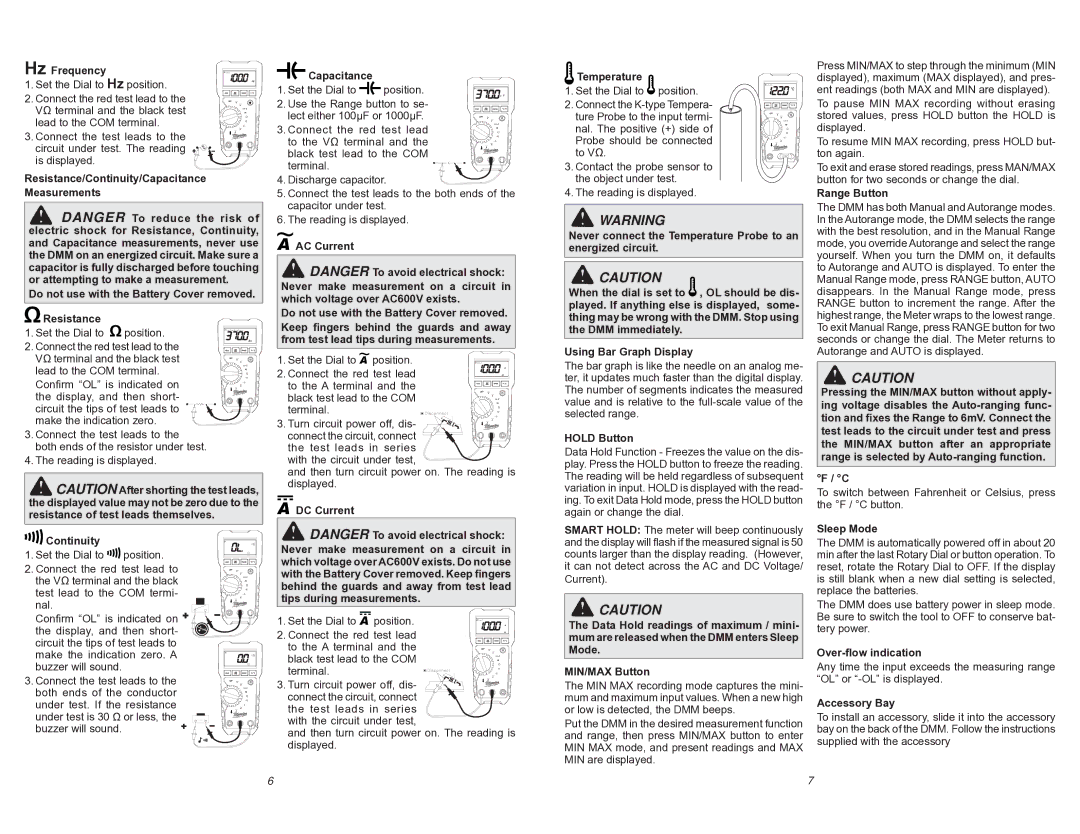Hz Frequency
1. Set the Dial to Hz position.
2. Connect the red test lead to the VΩ terminal and the black test lead to the COM terminal.
3. Connect the test leads to the circuit under test. The reading is displayed.
Resistance/Continuity/Capacitance Measurements
DANGER To reduce the risk of electric shock for Resistance, Continuity, and Capacitance measurements, never use the DMM on an energized circuit. Make sure a capacitor is fully discharged before touching or attempting to make a measurement.
Do not use with the Battery Cover removed.
 Resistance
Resistance
1. Set the Dial to  position.
position.
2. Connect the red test lead to the VΩ terminal and the black test lead to the COM terminal.
Confirm “OL” is indicated on the display, and then short- circuit the tips of test leads to make the indication zero.
3.Connect the test leads to the
both ends of the resistor under test.
4.The reading is displayed.
 CAUTION After shorting the test leads, the displayed value may not be zero due to the resistance of test leads themselves.
CAUTION After shorting the test leads, the displayed value may not be zero due to the resistance of test leads themselves.
Temperature
1. Set the Dial to position.
2.Connect the K-type Tempera- ture Probe to the input termi- nal. The positive (+) side of Probe should be connected to VΩ.
3.Contact the probe sensor to the object under test.
4.The reading is displayed.
 WARNING
WARNING
Never connect the Temperature Probe to an energized circuit.
 CAUTION
CAUTION
When the dial is set to , OL should be dis- played. If anything else is displayed, some- thing may be wrong with the DMM. Stop using the DMM immediately.
Using Bar Graph Display
The bar graph is like the needle on an analog me- ter, it updates much faster than the digital display. The number of segments indicates the measured value and is relative to the full-scale value of the selected range.
HOLD Button
Data Hold Function - Freezes the value on the dis- play. Press the HOLD button to freeze the reading. The reading will be held regardless of subsequent variation in input. HOLD is displayed with the read- ing. To exit Data Hold mode, press the HOLD button again or change the dial.
Press MIN/MAX to step through the minimum (MIN displayed), maximum (MAX displayed), and pres- ent readings (both MAX and MIN are displayed).
To pause MIN MAX recording without erasing stored values, press HOLD button the HOLD is displayed.
To resume MIN MAX recording, press HOLD but- ton again.
To exit and erase stored readings, press MAN/MAX button for two seconds or change the dial.
Range Button
The DMM has both Manual and Autorange modes. In the Autorange mode, the DMM selects the range with the best resolution, and in the Manual Range mode, you override Autorange and select the range yourself. When you turn the DMM on, it defaults to Autorange and AUTO is displayed. To enter the Manual Range mode, press RANGE button, AUTO disappears. In the Manual Range mode, press RANGE button to increment the range. After the highest range, the Meter wraps to the lowest range. To exit Manual Range, press RANGE button for two seconds or change the dial. The Meter returns to Autorange and AUTO is displayed.
CAUTION
Pressing the MIN/MAX button without apply- ing voltage disables the Auto-ranging func- tion and fixes the Range to 6mV. Connect the test leads to the circuit under test and press the MIN/MAX button after an appropriate range is selected by Auto-ranging function.
°F / °C
To switch between Fahrenheit or Celsius, press the °F / °C button.
 DANGER To avoid electrical shock: Never make measurement on a circuit in which voltage over AC600V exists. Do not use with the Battery Cover removed. Keep fingers behind the guards and away from test lead tips during measurements.
DANGER To avoid electrical shock: Never make measurement on a circuit in which voltage over AC600V exists. Do not use with the Battery Cover removed. Keep fingers behind the guards and away from test lead tips during measurements.
1. Set the Dial to position.
2. Connect the red test lead to the A terminal and the black test lead to the COM terminal.
3. Turn circuit power off, dis- connect the circuit, connect the test leads in series with the circuit under test,
and then turn circuit power on. The reading is displayed.
SMART HOLD: The meter will beep continuously and the display will flash if the measured signal is 50 counts larger than the display reading. (However, it can not detect across the AC and DC Voltage/ Current).
 CAUTION
CAUTION
The Data Hold readings of maximum / mini- mum are released when the DMM enters Sleep Mode.
MIN/MAX Button
The MIN MAX recording mode captures the mini- mum and maximum input values. When a new high or low is detected, the DMM beeps.
Put the DMM in the desired measurement function and range, then press MIN/MAX button to enter MIN MAX mode, and present readings and MAX MIN are displayed.
Sleep Mode
The DMM is automatically powered off in about 20 min after the last Rotary Dial or button operation. To reset, rotate the Rotary Dial to OFF. If the display is still blank when a new dial setting is selected, replace the batteries.
The DMM does use battery power in sleep mode. Be sure to switch the tool to OFF to conserve bat- tery power.
Over-flow indication
Any time the input exceeds the measuring range “OL” or “-OL” is displayed.
Accessory Bay
To install an accessory, slide it into the accessory bay on the back of the DMM. Follow the instructions supplied with the accessory

